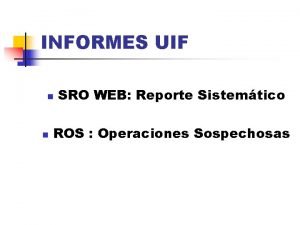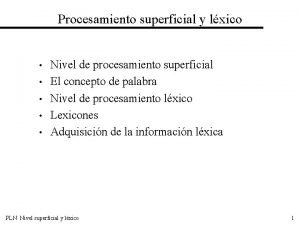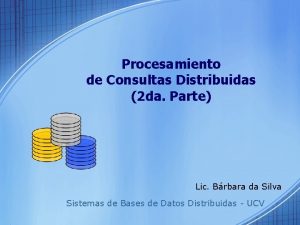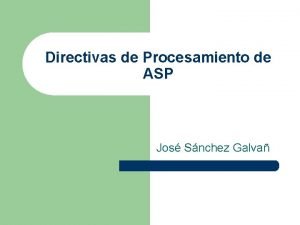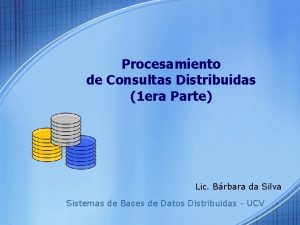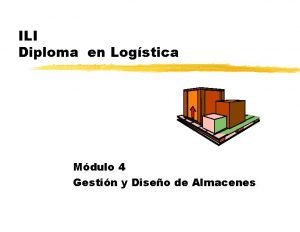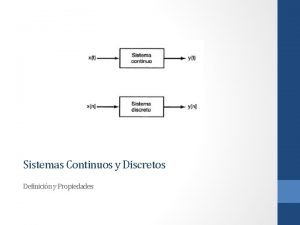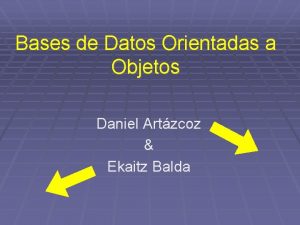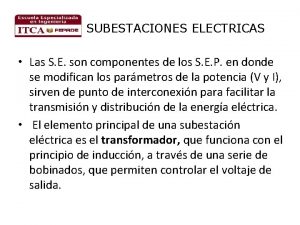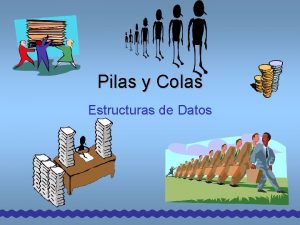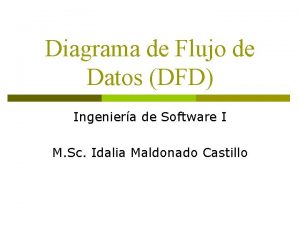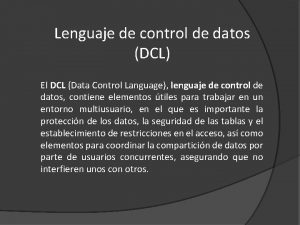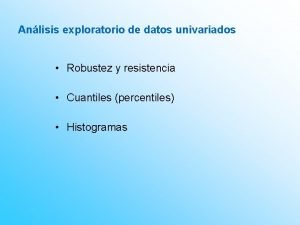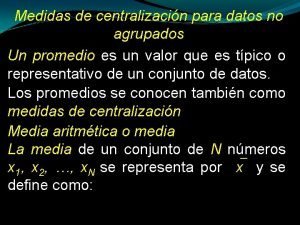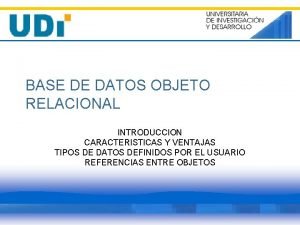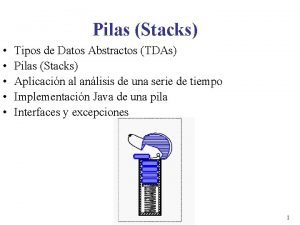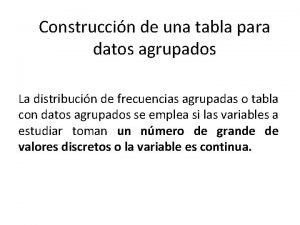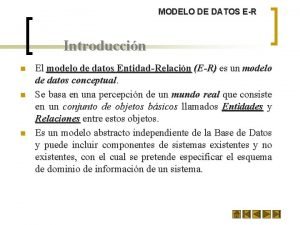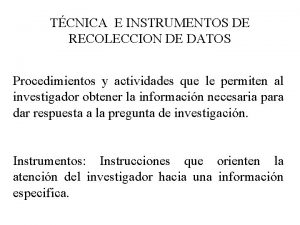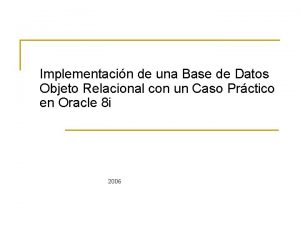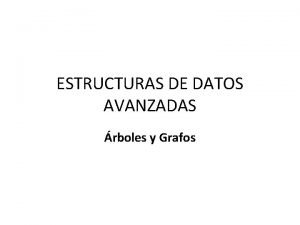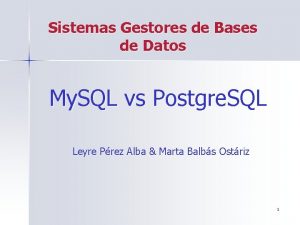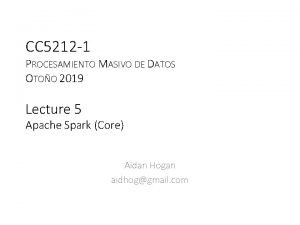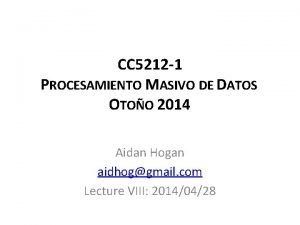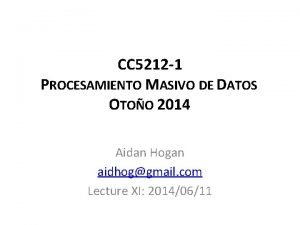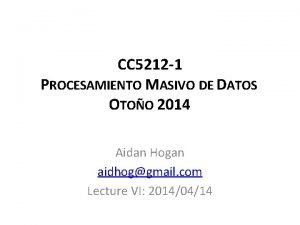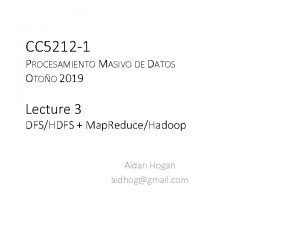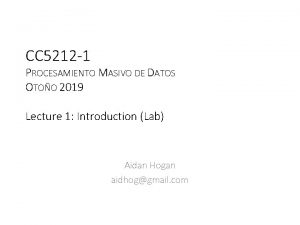CC 5212 1 PROCESAMIENTO MASIVO DE DATOS OTOO




















































































- Slides: 84

CC 5212 -1 PROCESAMIENTO MASIVO DE DATOS OTOÑO 2018 Lecture 6 Information Retrieval: Crawling & Indexing Aidan Hogan aidhog@gmail. com


MANAGING TEXT DATA

Information Overload

If we didn’t have search … •

The book that indexes the library

WEB SEARCH/RETRIEVAL

Building Google Web-search

Building Google Web-search What processes/algorithms does Google need to implement Web search? 1. 2. 3. Crawling Parse links from webpages Schedule links for crawling Download pages, GOTO 1 Ranking How relevant is a page? (TF-IDF) How important is it? (Page. Rank) How many users clicked it? 1. 2. 3. Indexing Parse keywords from webpages Index keywords to webpages Manage updates. . .

INFORMATION RETRIEVAL: CRAWLING

How does Google know about the Web?

Crawling Download the Web. crawl(list seed. Urls) frontier_i = seed. Urls while(!frontier_i. is. Empty()) new list frontier_i+1 for url : frontier_i page = download. Page(url) frontier_i+1. add. All(extract. Urls(page)) store(page) i++ What’s missing?

Crawling: Avoid Cycles Download the Web. crawl(list seed. Urls) frontier_i = seed. Urls new set urls. Seen while(!frontier_i. is. Empty()) new list frontier_i+1 for url : frontier_i page = download. Page(url) urls. Seen. add(url) frontier_i+1. add. All(extract. Urls(page). remove. All(urls. Seen)) store(page) i++ Performance?

Crawling: Avoid Cycles Download the Web. crawl(list seed. Urls) frontier_i = seed. Urls new set urls. Seen while(!frontier_i. is. Empty()) new list frontier_i+1 for url : frontier_i page = download. Page(url) urls. Seen. add(url) frontier_i+1. add. All(extract. Urls(page). remove. All(urls. Seen)) store(page) i++ Performance?

Crawling: Avoid Cycles Download the Web. crawl(list seed. Urls) frontier_i = seed. Urls new set urls. Seen while(!frontier_i. is. Empty()) new list frontier_i+1 for url : frontier_i page = download. Page(url) urls. Seen. add(url) Ø Majority of time spent waiting for connection frontier_i+1. add. All(extract. Urls(page). remove. All(urls. Seen)) Ø Disk/CPU usage will be near 0 store(page) Ø Bandwidth will not be maximised i++ Performance?

Crawling: Multi-threading Important crawl(list seed. Urls) frontier_i = seed. Urls new set urls. Seen while(!frontier_i. is. Empty()) new list frontier_i+1 new list threads for url : frontier_i thread = new Download. Page. Thread. run(url, urls. Seen, frontier_i+1) threads. add(thread) threads. poll() i++ Download. Page. Thread: run(url, urls. Seen, frontier_i+1) page = download. Page(url) synchronised: urls. Seen. add(url) synchronised: frontier_i+1. add. All(extract. Urls(page). remove. All(urls. Seen)) synchronised: store(page)

Crawling: Multi-threading Important Crawl 1, 000 URLs …

Crawling: Important to be Polite! (Distributed) Denial of Server Attack: (D)Do. S

Crawling: Avoid (D)Do. Sing Ø Christopher Weatherhead Ø 18 months prison … more likely your IP range will be banned

Crawling: Web-site Scheduler crawl(list seed. Urls) frontier_i = seed. Urls new set urls. Seen while(!frontier_i. is. Empty()) new list frontier_i+1 new list threads for url : schedule(frontier_i) #maximise time between two pages on one site thread = new Download. Page. Thread. run(url, urls. Seen, fronter_i+1) threads. add(thread) threads. poll() i++ Download. Page. Thread: run(url, urls. Seen, frontier_i+1) page = download. Page(url) synchronised: urls. Seen. add(url) synchronised: frontier_i+1. add. All(extract. Urls(page). remove. All(urls. Seen)) synchronised: store(page)

Robots Exclusion Protocol http: //website. com/robots. txt User-agent: * Disallow: / No bots allowed on the website. User-agent: * Disallow: /user/ Disallow: /main/login. html No bots allowed in /user/ sub-folder or login page. User-agent: googlebot Disallow: / Ban only the bot with “user-agent” googlebot.

Robots Exclusion Protocol (non-standard) User-agent: googlebot Crawl-delay: 10 Tell the googlebot to only crawl a page from this host no more than once every 10 seconds. User-agent: * Disallow: / Allow: /public/ Ban everything but the /public/ folder for all agents User-agent: * Sitemap: http: //example. com/main/sitemap. xml Tell user-agents about your site-map

Site-Map: Additional crawler information

Crawling: Important Points • Seed-list: Entry point for crawling • Frontier: Extract links from current pages for next round • Seen-list: Avoid cycles • Threading: Keep machines busy • Politeness: Don’t annoy web-sites – Set delay between crawling pages on the same web-site – Stick to what’s stated in the robots. txt file – Check for a site-map

Crawling: Distribution How might we implement a distributed crawler? for url : frontier_i-1 map(url, count) 1 2 3 4 Similar benefits to multi-threading What will be the bottleneck as machines increase? Bandwidth or politeness delays 5

Crawling: All the Web? Can we crawl all the Web?

Crawling: All the Web? Can we crawl all the Web? Can Google crawl all the Web?

Crawling: Inaccessible (Bow-Tie) Broder et al. “Graph structure in the web, ” Comput. Networks, vol. 33, no. 1 -6, pp. 309– 320, 2000

Crawling: Inaccessible (Deep Web) What is the Deep Web?

Crawling: Inaccessible (Deep Web) What is the Deep Web? • Dynamically-generated content

Crawling: Inaccessible (Deep Web) What is the Deep Web? • Dynamically-generated content • Password-protected

Crawling: Inaccessible (Deep Web) What is the Deep Web? • Dynamically-generated content • Password-protected • Dark Web

Crawling: Inaccessible (Deep Web) What is the Deep Web? • Dynamically-generated content • Password-protected • Dark Web 46% of statistics made up on the spot

Crawling: All the Web? Can we crawl all the Web? Can Google crawl itself?

Apache Nutch • Open-source crawling framework! • Compatible with Hadoop! https: //nutch. apache. org/

INFORMATION RETRIEVAL: INVERTED INDEXING

Inverted Index • Inverted Index: A map from words to documents – “Inverted” because usually documents map to words Examples of applications?

Inverted Index: Example 1 Fruitvale Station is a 2013 American drama film written and directed by Ryan Coogler. Inverted index: Term List Posting List a (1, 2, …) american (1, 5, …) and (1, 2, …) by (1, 2, …) directed (1, 2, …) drama (1, 16, …) … …

Inverted Index: Example Search american drama • AND: Intersect posting lists • OR: Union posting lists • PHRASE: ? ? ? How should we implement PHRASE? Inverted index: Term List Posting List a (1, 2, …) american (1, 5, …) and (1, 2, …) by (1, 2, …) directed (1, 2, …) drama (1, 16, …) … …

Inverted Index: Example 1 1 10 18 21 23 28 37 43 47 55 59 68 71 76 Fruitvale Station is a 2013 American drama film written and directed by Ryan Coogler. Inverted index: Term List Posting List a (1, [21, 96, 103, …]), (2, […]), … american (1, [28, 123]), (5, […]), … and (1, [57, 139, …]), (2, […]), … by (1, [70, 157, …]), (2, […]), … directed (1, [61, 212, …]), (4, […]), … drama (1, [38, 87, …]), (16, […]), … … …

Inverted Index: Flavours Record-level inverted index: Maps words to documents without positional information Word-level inverted index: Additionally maps words with positional information Term List Posting List a (1, 2, …) american (1, 5, …) and (1, 2, …) by (1, 2, …) directed (1, 2, …) drama (1, 16, …) … … Term List Posting List a (1, [21, 96, 103, …]), (2, […]), … american (1, [28, 123]), (5, […]), … and (1, [57, 139, …]), (2, […]), … by (1, [70, 157, …]), (2, […]), … directed (1, [61, 212, …]), (4, […]), … drama (1, [38, 87, …]), (16, […]), … … …

Inverted Index: Word Normalisation drama america How can we solve this problem? Inverted index: Term List Posting List a (1, [21, 96, 103, …]), (2, […]), … american (1, [28, 123]), (5, […]), … and (1, [57, 139, …]), (2, […]), … by (1, [70, 157, …]), (2, […]), … directed (1, [61, 212, …]), (4, […]), … drama (1, [38, 87, …]), (16, […]), … … …

Inverted Index: Word Normalisation drama america How can we solve this problem? Normalise words: Stemming cuts the ends off of words using generic rules: { America , American , americas , americanise } → { america } Inverted index: Term List Posting List a (1, [21, 96, 103, …]), (2, […]), … american (1, [28, 123]), (5, […]), … and (1, [57, 139, …]), (2, […]), … by (1, [70, 157, …]), (2, […]), … directed (1, [61, 212, …]), (4, […]), … drama (1, [38, 87, …]), (16, […]), … … …

Inverted Index: Word Normalisation drama america How can we solve this problem? Normalise words: Stemming cuts the ends off of words using generic rules: { America , American , americas , americanise } → { america } Lemmatisation uses knowledge of the word to normalise: { better , goodly , best } → { good } Inverted index: Term List Posting List a (1, [21, 96, 103, …]), (2, […]), … american (1, [28, 123]), (5, […]), … and (1, [57, 139, …]), (2, […]), … by (1, [70, 157, …]), (2, […]), … directed (1, [61, 212, …]), (4, […]), … drama (1, [38, 87, …]), (16, […]), … … …

Inverted Index: Word Normalisation drama america How can we solve this problem? Normalise words: Stemming cuts the ends off of words using generic rules: { America , American , americas , americanise } → { america } Lemmatisation uses knowledge of the word to normalise: { better , goodly , best } → { good } Term List Inverted index: Posting Lists a Synonym expansion (1, [21, 96, 103, …]), (2, […]), … american (1, [28, 123]), (5, […]), … { film , movie } → { movie } and (1, [57, 139, …]), (2, […]), … by (1, [70, 157, …]), (2, […]), … directed (1, [61, 212, …]), (4, […]), … drama (1, [38, 87, …]), (16, […]), … … …

Inverted Index: Word Normalisation drama america How can we solve this problem? Normalise words: Stemming cuts the ends off of words using generic rules: { America , American , americas , americanise } → { america } Lemmatisation uses knowledge of the word to normalise: { better , goodly , best } → { good } Term List Posting Lists a Synonym expansion (1, [21, 96, 103, …]), (2, […]), … american (1, [28, 123]), (5, […]), … { film , movie } → { movie } (1, [57, 139, …]), (2, […]), … ØInverted index: Language specific! and by (1, [70, 157, …]), (2, […]), … Ø Use same normalisation on query and document! directed (1, [61, 212, …]), (4, […]), … drama (1, [38, 87, …]), (16, […]), … … …

Inverted Index: Space Record-level inverted index: Maps words to documents without positional information Term List Posting List a (1, 2, …) american (1, 5, …) and (1, 2, …) by (1, 2, …) directed (1, 2, …) drama (1, 16, …) … … Term List Posting List a (1, [21, 96, 103, …]), (2, […]), … american (1, [28, 123]), (5, […]), … and (1, [57, 139, …]), (2, […]), … by (1, [70, 157, …]), (2, […]), … directed (1, [61, 212, …]), (4, […]), … drama (1, [38, 87, …]), (16, […]), … … … Space? Word-level inverted index: Additionally maps words with positional information Space?

Inverted Index: Unique Words Not so many unique words … – Heap’s law: – English text Number of unique words in text • K ∈ [10, 100] • β ∈ [0. 4, 0. 6] Raw words versus unique words Number of words in text

Inverted Index: Space Record-level inverted index: Maps words to documents without positional information Term List Posting List a (1, 2, …) american (1, 5, …) and (1, 2, …) by (1, 2, …) directed (1, 2, …) drama (1, 16, …) … … Term List Posting List a (1, [21, 96, 103, …]), (2, […]), … american (1, [28, 123]), (5, […]), … and (1, [57, 139, …]), (2, […]), … by (1, [70, 157, …]), (2, […]), … directed (1, [61, 212, …]), (4, […]), … drama (1, [38, 87, …]), (16, […]), … … … Space? Word-level inverted index: Additionally maps words with positional information Space?

Inverted Index: Common Words Many occurrences of few words / Few occurrences of many words – Zipf’s law – In English text: • • “the” 7% “of” 3. 5% “and” 2. 7% 135 words cover half of all occurrences Zipf’s law: the most popular word will occur twice as often as the second most popular word, thrice as often as the third most popular word, n times as often as the n-most popular word.

Inverted Index: Common Words Many occurrences of few words / Few occurrences of many words – Zipf’s law Expect long posting lists for common words – In English text: • • “the” 7% “of” 3. 5% “and” 2. 7% 135 words cover half of all occurrences Zipf’s law: the most popular word will occur twice as often as the second most popular word, thrice as often as the third most popular word, n times as often as the n-most popular word.

Inverted Index: Common Words • Perhaps implement stop-words? • Most common words contain least information the drama in america

Inverted Index: Common Words • Perhaps implement stop-words? • Perhaps implement block-addressing? Fruitvale Station is a 2013 American drama film written and directed by Ryan Coogler. Block 2 Block 1 What is the effect on phrase search? Small blocks ~ okay Big blocks ~ not okay Term List Posting List a (1, [1, …]), (2, […]), … american (1, [1, …]), (5, […]), … and (1, [2, …]), (2, […]), … by (1, [2, …]), (2, […]), … … …

Inverted Index: Common Words Many occurrences of few words / Few occurrences of many words – Zipf’s law Expect long posting lists for common words – In English text: Expect more queries with common words • • “the” 7% “of” 3. 5% “and” 2. 7% 135 words cover half of all occurrences Zipf’s law: the most popular word will occur twice as often as the second most popular word, thrice as often as the third most popular word, n times as often as the n-most popular word.

The Long Tail of Search

The Long Tail of Search How to optimise for this? Caching for common queries like “coffee”

If interested …

Search Implementation • Vocabulary keys: – Hashing: O(1) lookups (assuming ideal hashing) • no range queries • relatively easy to update (though rehashing expensive!) – Sorting/B-Tree: O(log(u)) lookups, u unique words • range queries • tricky to update (standard methods for B-trees) – Tries: O(l) lookups, l length of the word • range queries, compressed, auto-completion! • referencing becomes tricky (on disk) Tries? (in class)

Memory Sizes • Term list (vocabulary keys) small: – Often will fit in memory! • Posting lists larger: – On disk / Hot regions cached Term List Posting List a (1, [21, 96, 103, …]), (2, […]), … american (1, [28, 123]), (5, […]), … and (1, [57, 139, …]), (2, […]), … by (1, [70, 157, …]), (2, […]), … directed (1, [61, 212, …]), (4, […]), … drama (1, [38, 87, …]), (16, […]), … … …

Compression techniques • Numeric compression important Term List Posting List country (1), (2), (3), (4), (6), (7), … … …

Compression techniques: High Level • Interval indexing – Example for record-level indexing • Could also be applied for block-level indexing, etc. Term List Posting List country (1), (2), (3), (4), (6), (7), … … … Term List Posting List country (1– 4), (6– 7), … …

Compression techniques: High Level • Gap indexing – Example for record-level indexing • Could also be applied for block-level indexing, etc. Benefit? Term List Posting List country (1), (3), (4), (8), (9), … … … Term List Posting Lists country (1), 2, 1, 4, 1 … … Repeated small numbers easier to compress!

Compression techniques: Bit Level • Variable length coding: bit-level techniques • For example, Elias γ (gamma) encoding – Assumes many small numbers a zero marker next n binary numbers final Elias γ code z: integer to encode n=� log 2(z)� coded in unary 1 0 2 1 0 0 100 3 1 0 1 101 4 11 0 00 11000 5 11 0 01 11001 6 11 0 10 11010 7 11 0 11 11011 8 111 0 000 1110000 … … … 0 Can you decode “ 010000111000011001”? <1, 2, 1, 1, 4, 8, 5>

Compression techniques: Bit Level • Variable length coding: bit-level techniques • For example, Elias δ (delta) encoding – Better for some distributions next � log 2(z)� binary numbers final Elias δ code z: integer to encode � log 2(z)�+ 1 coded in Elias γ 1 0 2 100 0 1000 3 100 1 1001 4 101 00 10100 5 101 01 10101 6 101 10 10110 7 101 11 10111 8 11000000 … … 0 Can you decode “ 0110000011001001”? <1, 9, 3, 1, 17>

Compression techniques: Bit Level • Previous methods “non-parametric” – Don’t take an input value • Other compression techniques parametric: – for example, Golomb-3 code: z: integer to encode n=� (z-1)/3�coded in unary 1 zero separator remainder final Golomb-3 code 0 0 00 2 0 10 010 3 0 11 011 4 1 0 0 100 5 1 0 10 1010 6 1 0 11 1011 7 11 0 0 1100 8 11 0 10 11010 … …

Compression techniques: Byte Level • Use variable length byte codes • Use last bit of byte to indicate if the number ends • For example: 00100100 10100010 18 81 00000101 00100100 274

Other Optimisations • Top-Doc: Order posting lists to give likely “top documents” first: good for top-k results • Selectivity: Load the posting lists for the most rare keywords first; apply thresholds • Sharding: Distribute over multiple machines How to distribute? (in class)

Extremely Scalable/Efficient When engineered correctly

LUCENE: TEXT INDEXING

Apache Lucene • Inverted Index – They built one so you don’t have to! – Open Source in Java

(Apache Solr) • Built on top of Apache Lucene • Lucene is the inverted index • Solr is a distributed search platform, with distribution, fault tolerance, etc. • We will work with Lucene in the lab

Apache Lucene: Indexing Documents … continued …

Apache Lucene: Indexing Documents … continued …

Apache Lucene: Searching Documents

Apache Lucene: Searching Documents

CONTROL: FRIDAY

Friday, 18 th April • 2 hours • Four questions, all mandatory 1. 2. 3. 4. Distributed systems/GFS Map. Reduce/Hadoop PIG Spark • One page of notes (back and front)

CLASS PROJECTS

Course Marking • 55% for Weekly Labs (~5% a lab!) • 15% for Class Project • 30% for 2 x Controls Assignments each week Only need to pass overall! Controls No final exam! Working in groups!

Class Project • Done in threes • Goal: Use what you’ve learned to do something cool/fun (hopefully) • Expected difficulty: A bit more than a lab’s worth – But without guidance (can extend lab code) • Marked on: Difficulty, appropriateness, scale, good use of techniques, presentation, coolness, creativity, value – Ambition is appreciated, even if you don’t succeed • Process: – Start thinking up topics / find interesting datasets! • Deliverables: 4 minute presentation & short report

NEXT WEEK

Exercise • I will not be here next week • Exercise (groups of two): – Find movies with rating greater than X, with number of votes greater than Y, where all actors are male|female – In Map. Reduce (Java), Pig, Spark!


Questions?
 Perforacion esofagica
Perforacion esofagica Medios publicitarios afiches
Medios publicitarios afiches Jonctiune condrocostala
Jonctiune condrocostala Sro uif
Sro uif Procesamiento superficial
Procesamiento superficial Modelo de procesamiento de la información
Modelo de procesamiento de la información Procesamiento de informacion por medios digitales
Procesamiento de informacion por medios digitales Procesamiento de consultas distribuidas
Procesamiento de consultas distribuidas Juegos de velocidad de procesamiento
Juegos de velocidad de procesamiento Directivas de procesamiento
Directivas de procesamiento Procesamiento en serie
Procesamiento en serie Procesamiento de consultas distribuidas
Procesamiento de consultas distribuidas Procesamiento de glicoproteínas
Procesamiento de glicoproteínas Pangunahing datos at sekondaryang datos
Pangunahing datos at sekondaryang datos Que son los datos objetivos y subjetivos
Que son los datos objetivos y subjetivos Inventario promedio
Inventario promedio Escribe los siguientes datos
Escribe los siguientes datos Modulo de transmision de datos comunes
Modulo de transmision de datos comunes Datos discretos o continuos
Datos discretos o continuos Sa tulong ng k-w-h-l
Sa tulong ng k-w-h-l Ejemplos de sistemas discretos y continuos
Ejemplos de sistemas discretos y continuos Bdoo
Bdoo Placa de datos
Placa de datos Estructuras de datos
Estructuras de datos Que es el modelo relacional en programacion
Que es el modelo relacional en programacion Proceso de encapsulamiento de datos
Proceso de encapsulamiento de datos Diagrama de flujo de un sistema
Diagrama de flujo de un sistema Restricciones no estructurales base de datos
Restricciones no estructurales base de datos Que es el lenguaje de control de datos
Que es el lenguaje de control de datos Datos univariados
Datos univariados {auth_040}
{auth_040} Medida de tendencia central para datos agrupados
Medida de tendencia central para datos agrupados Bases de datos
Bases de datos Hallar x
Hallar x Papiro
Papiro Base de datos objeto relacional
Base de datos objeto relacional Redundancia conceptual
Redundancia conceptual Modelos de base de datos
Modelos de base de datos Procesador de consultas en base de datos
Procesador de consultas en base de datos Diferencias finitas
Diferencias finitas Normalización de base de datos
Normalización de base de datos Cardinalidad en base de datos
Cardinalidad en base de datos Pensamiento aleatorio ejercicios
Pensamiento aleatorio ejercicios Tipos de datos abstractos
Tipos de datos abstractos Tabla de frecuencia para datos agrupados
Tabla de frecuencia para datos agrupados Que son datos discretos y continuos
Que son datos discretos y continuos Modelo de datos
Modelo de datos Instrumentos de recolección de datos
Instrumentos de recolección de datos Datos primarios en una investigacion de mercados
Datos primarios en una investigacion de mercados Organizador visual de edipo rey
Organizador visual de edipo rey Partes del sobre de la carta
Partes del sobre de la carta Datos variables y constantes
Datos variables y constantes Datos informativos del docente
Datos informativos del docente Caracter alfanumerico
Caracter alfanumerico Base de datos ies
Base de datos ies Origen y concepto de flujo de datos transfronterizos
Origen y concepto de flujo de datos transfronterizos Base de datos de una pizzeria
Base de datos de una pizzeria Desviacion media para datos agrupados
Desviacion media para datos agrupados Diagrama de flujo proceso alternativo
Diagrama de flujo proceso alternativo Supertipo y subtipo base de datos
Supertipo y subtipo base de datos Cuaderno de recogida de datos
Cuaderno de recogida de datos Ano ang mga halimbawa ng plagiarism
Ano ang mga halimbawa ng plagiarism Efectos fijos econometria
Efectos fijos econometria Desviacion estandar y varianza
Desviacion estandar y varianza Normalización bases de datos
Normalización bases de datos Buses de datos sata
Buses de datos sata Propagación de errores
Propagación de errores Bases de datos deductivas
Bases de datos deductivas Datos pareados y no pareados
Datos pareados y no pareados Lenguaje ldd
Lenguaje ldd Plataforma de intermediación de datos
Plataforma de intermediación de datos Acerca o hacerca
Acerca o hacerca Comunicación de datos
Comunicación de datos Elementos de seguridad de un cheque
Elementos de seguridad de un cheque Ciencia de datos ibm
Ciencia de datos ibm Estructuras de datos avanzadas
Estructuras de datos avanzadas Introduccion de arboles en estructura de datos
Introduccion de arboles en estructura de datos Gestores sql
Gestores sql Gawain 5:concept map
Gawain 5:concept map El lenguaje de definición de datos
El lenguaje de definición de datos Cuando nacio julio verne
Cuando nacio julio verne Upb bases de datos
Upb bases de datos Sprint base de datos
Sprint base de datos Cosas que debes de saber antes de morir
Cosas que debes de saber antes de morir Bases de datos post-relacionales
Bases de datos post-relacionales



